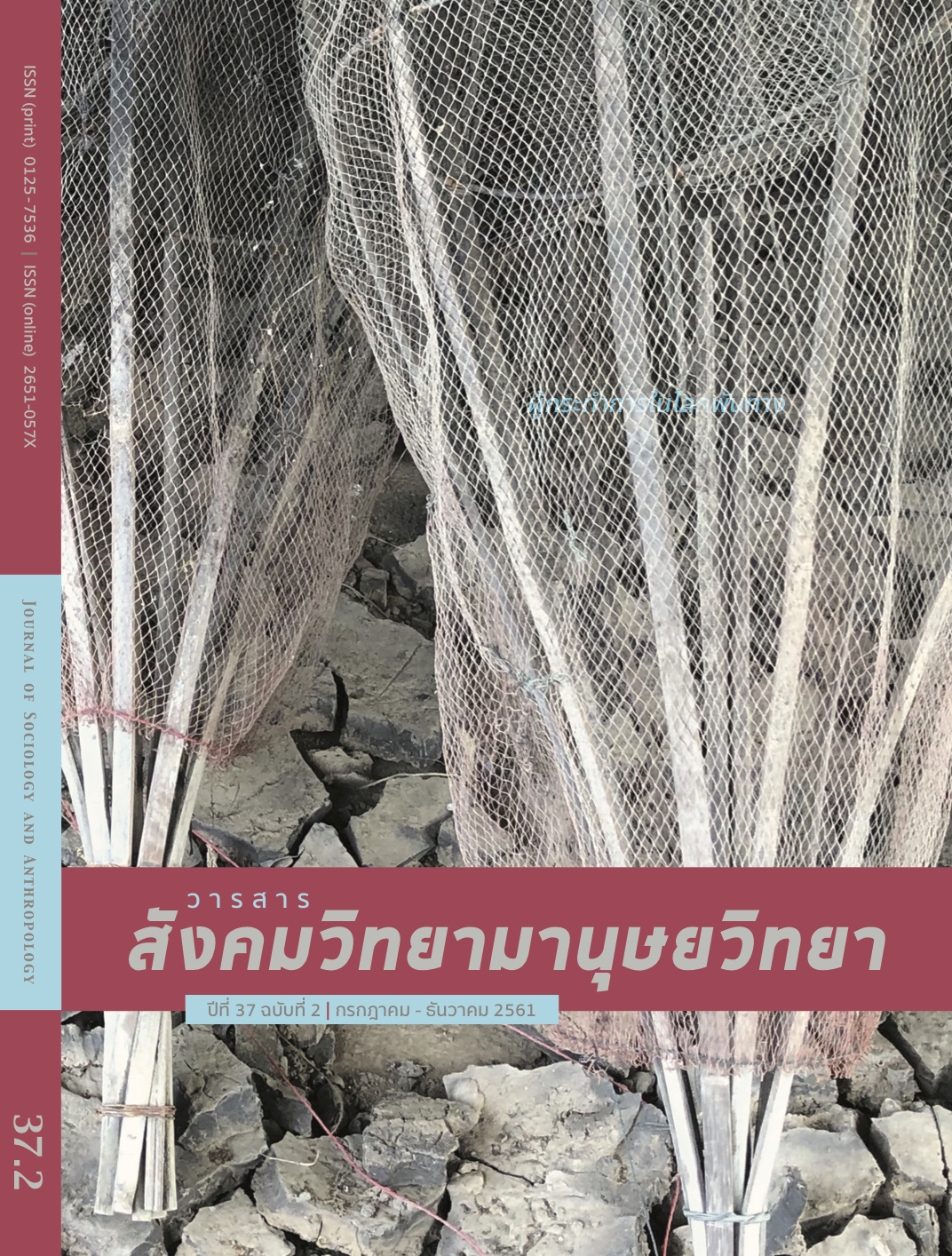Affective Economy of Thai Television Dramas in Cambodia and China
Keywords:
affective economy, television dramas, audience reception, melodrama, Cambodia, ChinaAbstract
This paper explores the consumption of Thai television dramas among its transnational audience in two important aspects. Firstly, it examines how the transnational audience of Thai dramas interpret meanings in the dramas and what elements the audience choose to interpret as representing “Thainess”. Secondly, the paper explores emotional affect of Thai television dramas. It asks what type of emotional expression the audience understood as “Thai”, and to what extent Thai TV dramas provide emotional and cultural resources that differ from other national TV dramas. The paper employs the concept of “affective economy” based on two different approaches to explore the consumption of Thai dramas: one that uses emotion to create connections between consumers and products, and the other considers cultural and political implications of emotion. Using case studies in Cambodia and China whose audience communities come from different socio-economic and political backgrounds, the paper examines emotional expression in Thai TV dramas, its functions and its implications towards transnational audience reception.
References
ดนัยธัญ พงษ์พัชราธรเทพ. 2555. การศึกษารสนิยมของผู้บริโภคชาวจีนที่มีต่อภาพยนตร์ไทยและละครไทย. เชียงใหม่: สถาบันศึกษานโยบายสาธารณะ มหาวิทยาลัยเชียงใหม่.
วสันต์ ปัญญาแก้ว. 2555. ลื้อข้ามแดน: การเดินทางของคนหนุ่มสาวชาวลื้อเมืองยอง รัฐฉาน ประเทศพม่า. เชียงใหม่: ศูนย์วิจัยและบริการวิชาการ คณะสังคมศาสตร์ มหาวิทยาลัยเชียงใหม่.
ศิริจิต สุนันต๊ะ. 2561. “ประเทศไทย โลกาภิวัตน์ กับเพศภาวะ: นโยบายด้านการท่องเที่ยว ของประเทศไทย กับการย้ายฐานงานดูแล และการผลิตซ้ำในระดับโลก.” วารสารสังคมวิทยามานุษยวิทยา 37(1): มกราคม - มิถุนายน, 127-149.
อัมพร จิรัฐติกร. 2559. ละครไทยกับผู้ชมอาเซียน: วัฒนธรรมศึกษาของสื่อข้ามพรมแดนในอาเซียน. เชียงใหม่: ศูนย์อาเซียนศึกษา มหาวิทยาลัยเชียงใหม่.
อัมพร จิรัฐติกร. 2561. “การบริโภคละครไทยผ่านเว็บไซต์ในกลุ่มประเทศอาเซียนและจีน: กรณีศึกษาประเทศเวียดนาม ฟิลิปปินส์ อินโดนีเซีย และจีน”. รายงานการวิจัย. กรุงเทพฯ: สำนักงานกองทุนสนับสนุนการวิจัย. เอกสารอยู่ระหว่างจัดทำ.
เอกสารภาษาอังกฤษ
Abu-Lughod, Lila. 2005. Drama of Nationhood: The politics of television in Egypt. Chicago and London: The University of Chicago Press.
Ahmed, Sara. 2004. The Cultural Politics of the Emotions. Edinburgh: Edinburgh University Press.
Allen, Robert. 1985. Speaking of Soap Operas. Chapel Hill: The University of North Carolina Press.
Ang, Ien. 1985. Watching Dallas: Soap opera and the melodramatic imagination. New York: Methuen.
Ayuttacorn, Arratee. 2014. “Body Politics and Affective Performance of Female Flight Attendants.” PhD Dissertation, Chiang Mai University.
Bakhtin, Mikhail. 1965 (1984). Rabelias and His World. Bloomington: Indiana University Press.
Bourdieu, Pierre. 1984. Distinction: A social critique of the judgement of taste. Translated by Richard Nice. Cambridge, MA: Harvard University Press.
Chan, Brenda. 2016. "The Circulation of Thai Television Dramas in China.” Paper presented at the Siam Society, Bangkok, Thailand, March 18, 2016.
Chua, Beng Huat. 2004. “Conceptualizing an East Asian Popular Culture.” Inter-Asia Cultural Studies 5(2): 200-221.
Hall, Stuart. 1997. “Encoding/Decoding”. In Media Studies: A reader, edited by Paul Marris and Sue Thornham, 41-49. Edinburgh: Edinburgh University Press.
Hochschild, Arlie. 2003. The Managed Heart: Commercialization of human feeling. Berkeley: University of California Press.
Iwabuchi, Koichi. 2002. Recentering Globalization: Popular culture and Japanese transnationalism. Durham and London: Duke University Press.
Jenkins, Henry. 2006. Convergence Culture: Where old and new media collide. New York: New York University Press.
Ju, Hyejung. 2010. “Glocalization of the Korean Popular Culture in East Asia: Theorizing the Korean wave.” PhD Dissertation, University of Oklahoma.
Ko, Yu-fen. 2004. “The Desired form: Japanese Idol Dramas in Taiwan.” In Feeling Asian Modernities: Transnational consumption of Japanese TV dramas, edited by Koichi Iwabuchi, 107-128. Hong Kong: Hong Kong University Press.
Kong, Shuyu. 2014. “Melodrama for Change: Gender, Kuqing Xi and the affective articulation of Chinese TV drama”. In The Political Economy of Affect and Emotion in East Asia, edited by Jie Yang, 116-133. London and New York: Routledge.
Leung, Lisa Yuk-ming. 2004. “Ganbaru and Its Transcultural Audience: Imaginary and reality of Japanese TV dramas in Hong Kong.” In Feeling Asian Modernities: Transnational consumption of Japanese TV dramas, edited by Koichi Iwabuchi, 89-106. Hong Kong: Hong Kong University Press.
Liebes, Tamar and Elihu Katz. 1990. The Export of Meaning: Cross-cultural readings of Dallas. New York: Oxford University Press.
Lin, Angel, and Avin Tong. 2008. “Re-imagining a Cosmopolitan ‘Asian Us’: Korean media flows and imaginaries of Asian modern femininities”. In East Asian Pop Culture: Analysing the Korean wave, edited by Chua Beng Huat and Koichi Iwabuchi, 91-125. Hong Kong: Hong Kong University Press.
Mankekar, Purnima. 2002. “Epic Contest: Television and Religious Identity in India.” In Media Worlds: Anthropology on new terrain, edited by Faye Ginsburg, Lila Abu-Lughod, and Brian Larkin, 134-151. Berkeley: University of California Press.
McQuail, Denis. 2010. McQuail’s Mass Communication Theory. New Delhi: Sage Publications.
Mori, Yoshitaka. 2008. “Winter Sonata and Cultural Practices of Active Fans in Japan: Considering middle-aged women as cultural agents”. In East Asian Pop Culture: Analysing the Korean wave, edited by Chua Beng Huat and Koichi Iwabuchi, 127-141. Hong Kong: Hong Kong University Press.
Rofel, Lisa. 1994. “ ‘Yearnings’: Televisual love and melodramatic politics in contemporary China.” American Ethnologist 21(4): 700-722.
Siriyuvasak, Ubonrat. 2010. “The Culture Industry and Asianization: The new imagined inter-Asia economy”. In Pop Culture Formations across East Asia, edited by Doobo Shim, Ariel Haryanto and Ubonrat Siriyuvasak, 149-179. Seoul: Jimoondang.
Toru, Ota. 2004. “Producing (Post) Trendy Japanese TV Dramas” In Feeling Asian Modernities: Transnational consumption of Japanese TV dramas, edited by Koichi Iwabuchi, 69-86. Hong Kong: Hong Kong University Press.



